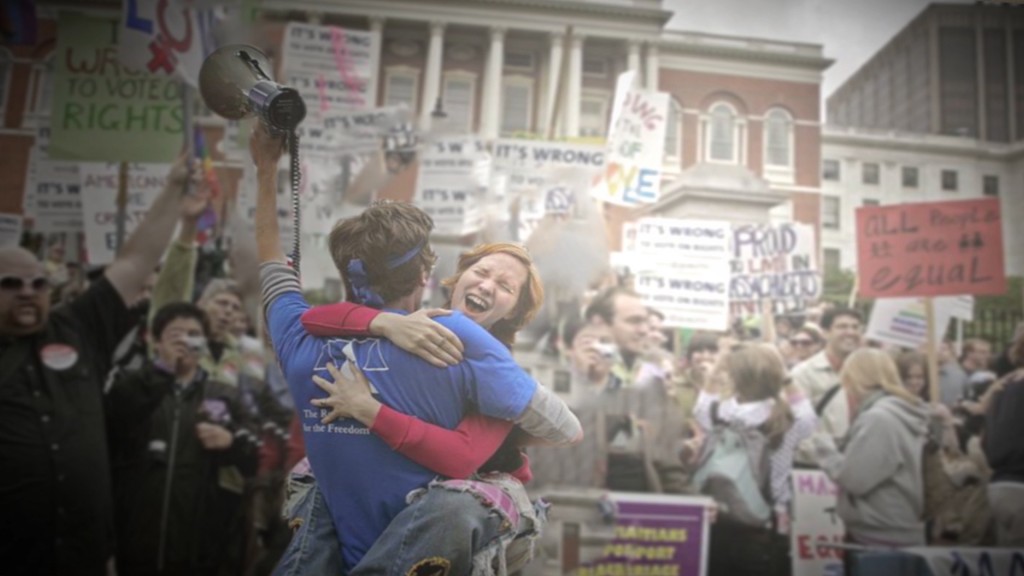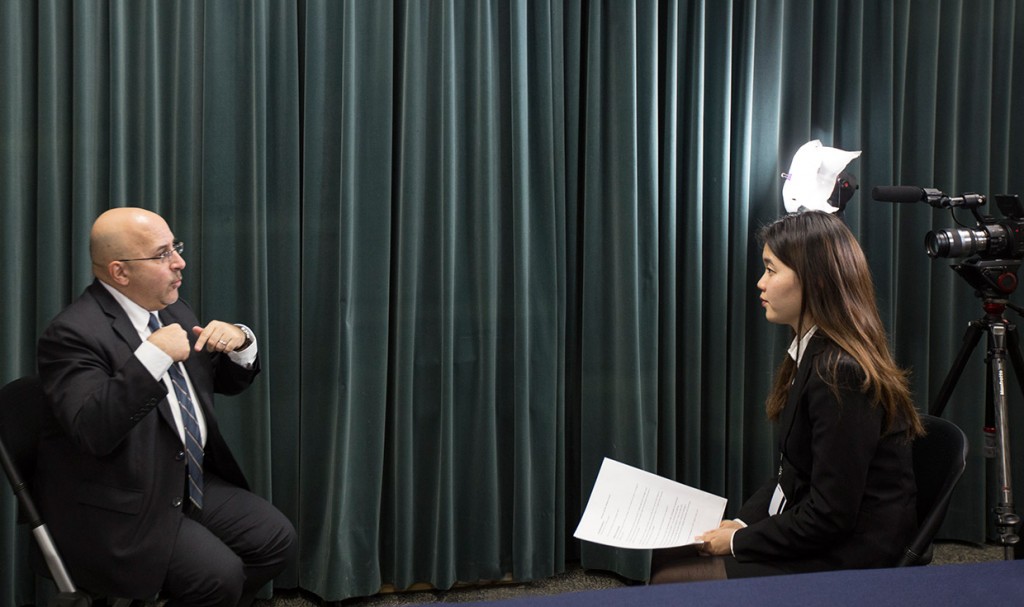Evan Wolfson founded the Freedom to Marry campaign in 2003 to lead efforts to make same-sex marriage legal in the United States. In 2004, Time magazine included Wolfson in its list of “the 100 most influential people in the world.” Wolfson was invited by the U.S. Embassy in Tokyo in February 2016 to speak at various venues throughout Japan about the significance of the U.S. Supreme Court ruling declaring same-sex marriage legal. While he was in Tokyo, I had the opportunity to speak with him about the Supreme Court ruling and future prospects for the LGBT rights movement.

The Freedom to Marry team (photo from http://www.freedomtomarry.org/)
American View: What did the Supreme Court decision on marriage equality mean to American society?
Wolfson: The Supreme Court ruling first of all meant that people who were not allowed to get married now could get married, so more than a million gay people have now gotten legally married in the United States. That brings tremendous happiness not only to the couples, but also to their families, friends, and communities. Millions of people are now sharing in the joy, happiness, and security that come with marriage.
It also was an affirmation of the Constitution’s guarantees of treating everybody equally, of freedom, of what it means to be part of a free society. This was a victory not just for gay people, but a victory for all of America. It was a victory for human rights.
It also was important because the Supreme Court ruling came after more than 70 courts across the country had looked at the arguments, weighed the evidence, and ruled in favor of the freedom to marry. Court after court studied the question and said there is no good reason for this discrimination. The courts were really reflecting the judgment that the American people had also made. When we got to the Supreme Court, we had grown public support from 27% when I was doing the first marriage case back in Hawaii in the 1990s, to 63%. The American people had talked and thought it through and moved in support, and then the law changed.
American View: Big changes like this don’t happen overnight. What were some of the breakthroughs that led to the Supreme Court decision?
Wolfson: Gay people in the United States have been fighting for the freedom to marry for more than 40 years. There were millions of conversations and many debates, battles, and losses in which people had a chance to learn more about who gay people are, to understand why marriage matters to gay people, and to understand that gay people are part of the community. As people got a chance to learn and think about that, hearts and minds changed. The public began moving.
We also had to organize. We had to go into the courts. We had to talk to the politicians and persuade them to do the right thing. For 32 years, I had been working on this and leading the campaign, Freedom to Marry, that helped bring together all the different organizations, the lawyers, the lobbyists, the activists, the ordinary people who were having conversations that helped change people’s minds. So after 32 years, we had this victory. I cried tears of happiness, and tears of memory, and tears of relief.

A happy clip from Freedom to Marry's award-winning victory celebration video, created by Eyepop Productions.
American View: What was the main energy source that made you keep believing you would win?
Wolfson: I always believed that if we talk to people about our lives and about who we really are, if we help them overcome their lack of knowledge or understanding, if we engage them and make the case, most people are fair. Most people don’t want to hate. Most people want to treat others with respect. If we give them the information they need, most people, I believed, would rise to fairness. I always believed that. I believed it was our job to make the case and help people do the right thing.
American View: What would you say are the next challenges for LGBT rights in the U.S.?
Wolfson: In the United States, we’ve won the freedom to marry and that was very important because before we won the freedom to marry, the government was discriminating against gay people. But there still is other discrimination in American society. There is no national law prohibiting discrimination on the basis of sexual orientation and gender identity in other important areas, such as employment or housing or public accommodations in services. We have a real need in the United States to pass laws prohibiting discrimination.
American View: In Shibuya, they’ve started to give certificates for partnerships between same-sex couples. This is not legal marriage, but it’s still a big change for Japan. What can young people like me do to contribute to major changes like this in Japanese society?
Wolfson: The chief engine of change is conversation. The more people talk about who gay people are and fairness in society, the more the people will move. Young people, whether in Japan or the United States, are often ahead of where other people in society are. They don’t have as much prejudice to overcome, so young people can play a very important part in having those conversations. In the United States, change in some ways was led by young people. The same can happen here in Japan.

Evan Wolfson talks about the importance of having conversations on LGBT issues during the interview.
American View: In the Japanese media, LGBT people are often portrayed as "drag queens" and “divas" instead of regular people. Could this be preventing people from realizing that LGBT individuals can be real and just like their friends and family?
Wolfson: There was polling done asking people in the United States and in Japan if they know somebody they work with or in their family who is gay or transgender. In the United States, 55% said they know somebody. In Japan, the number was 5%. The reason for the difference is not that there aren’t gay people. It’s that people don’t know there are gay people.
One of the things I’ve found most exciting on this trip to Japan has been the enthusiasm of the non-gay people who have been committed to moving Japan forward and adding their voice to the discussion. That’s very much what we need. We need gay people speaking out about our stories to our neighbors and friends, and we need non-gay people talking about the gay people in their lives and also their shared values of making sure the law treats everybody with respect and honoring and helping all families so that everybody can move forward together.
American View: What message would you like to convey on video to the Japanese people?
Although I was a little nervous because it was my first time doing an interview for American View, Wolfson’s comment about conversation being the chief engine of change left a strong impression on me. He has spent 40 years working to bring about a major shift in society to allow people to love and build connections with each other freely. Speaking to him made me realize that there are many things young people like me can do to help create an environment in Japan where diversity is accepted. We need to talk openly to our friends about sexual identity and exchange views with LGBT individuals. Having more conversations and discussions about sexual identity and same-sex marriage will encourage people to take action and bring about major changes. To begin with, I’m going to start talking about LGBT issues and expressing my opinion to my friends and family. Let’s all get involved and be part of the conversation!







COMMENTS1
結婚とは男と女がするものであり同性婚なんてあり得ない。
LGBTに寛容な国というのは病んでいるとしかいいようがない。
LEAVE A COMMENT
TOP